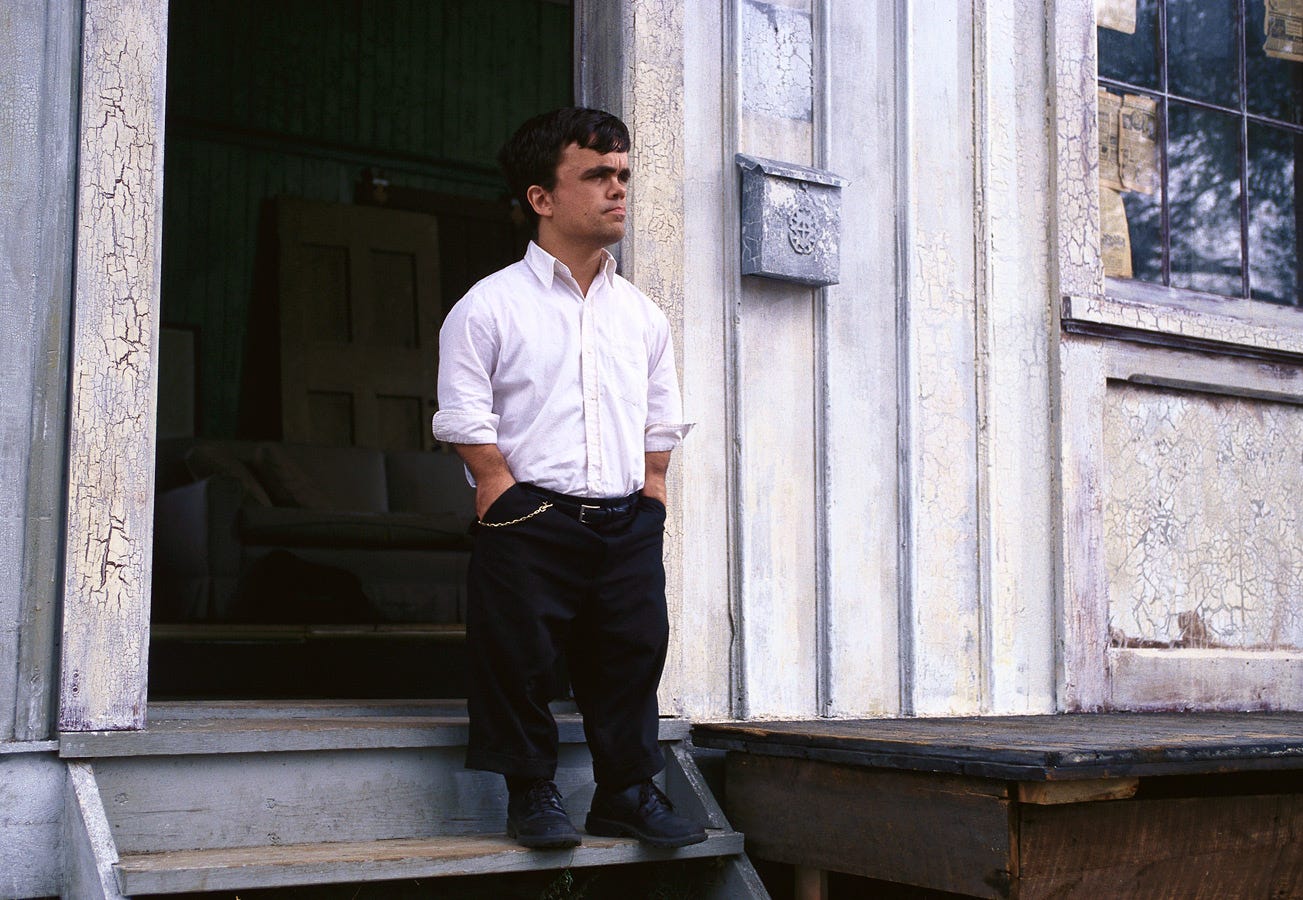Some movies are excellent when viewed with the right people, but they need to be more balanced when viewed alone. Suddenly, the slow sequences became tolerable, and the jokes started to laugh out loud. You will flinch in spooky situations. Watching moments with friends makes them immensely delightful, even when you thought they were ludicrous a while before. These are happy, poignant, exciting kinds of films. Do you want to laugh with the ones you love the most? With the selection of fun movies to watch with friends provided below, you can find the ideal film in this article.
Table of Contents
List of fun movies to watch with friends
The Station Agent

“The Station Agent” is the first film on thelist of fun movies to watch with friends. Stories of friendship, transformation, and loneliness are central to the movie. Each actor has developed into a role they play. There is nothing exaggerated in their conversations or behaviour. The characters provide compelling justifications for their choices. This endearing film is about a small man. He has to leave his root and move to a new place.
He is forced to leave his comfortable surroundings after his only friend dies. The little man settles himself and makes his home in the friend’s old railroad depot. The movie then highlights his social interactions with a number of people. The relationships he forms with them are the main subject of the story. Peter Dinklage does a terrific job.
Zombieland

Zombieland is a must-have for any zombie discussion. There is humor throughout the film. Moreover. You will discover some amazing, mind-numbing information. A bashful student in the narrative tries to contact his Ohioan relatives. There will be a bruiser with a rifle looking for the final Twinkie. Two sisters attempting to travel to an exciting theme park are the subject of the subplot. Together, they go on a journey across an America overrun with zombies.
Ruben Fleischer was the director, and it was produced in 2009. The movie centers on a nerdy university student navigating a zombie disaster post-apocalyptic world. Along the journey, he encounters the other three. Together, they set off on a lengthy road trip through the American Southwest regions in search of a haven without zombies.
Superbad

Greg Mottola was the one in charge of directing it. It tells the tale of two soon-to-be graduates of their senior year. Their goal is to become unfaithful and have wild parties. However, things don’t go as planned in the movie. They encounter challenges. These give the film a lot of highs and lows. They have been the closest of friends ever since they were children.
They will soon be attending separate colleges. In the home science lesson, Seth finds himself with the opportunity to work with Jules. She’s inviting him to her place for a party. At the beginning of the film, they make a promise that they will bring booze to the party after they receive a false identification card. When looking for fun movies to watch with friends, go for this one.
Bridesmaids

It is the next best fun movies to watch with friends. The endurance of an alliance is the central theme of this movie. They are popular to be called best friends. It’s among the greatest films to see with your buddies. You’ll see that the movie tends towards broad, even vulgar humor.-
Annie is so unhappy with her life that she acts with an air of desperation in all she does. Even with its realistic and heartfelt plot, it has the sense of a chick comedy. There is raunchiness throughout the movie. The entire thing is funny. Probably the best entertainment film of the year thus far is Bridesmaids. It is among the most hilarious chick cinema comedies ever made.
The Breakfast Club

The narrative is set in Chicago. Five teenagers’ inner life is the focal point of the story. They attend a secondary school. The teenagers spend one Saturday morning receiving punishment at the college library. They find that they are far more alike than they initially believed. Their only encounter had a lasting impact on their lives. It was made available in 1985. For the film, John Hughes served as the director.
The underlying story sets the movie apart and provides a unique viewpoint on adolescence. Consequently, it has become increasingly well-known during the 1980s. The narrative does a fantastic job of illustrating the ubiquitous and uncomfortable issue of identity crises. The excessive expectations people have of both themselves and the community they belong to are also depicted in the movie.
Knives Out

Do you like a good mystery with your friends? For entertaining films that are perfect for watching with friends, Knives Out is an absolute treasure. Impressive collaborative acting is on display in the picture. Benoit Blanc, an investigator for hire, is at the heart of the story.
Unquestionably, he was brought in to investigate the passing of legendary crime author and head of his clan, Harlen Thrombey. Soon after celebrating his eighty-five birthday, he was discovered deceased at his house. During that period, his family was requested to remain at that location. For little children, two situations may be frightening or upsetting.
Nevertheless, they lack emphasis and are brief. Knives Out resembles an Agatha Christie book with American protagonists and a current American setting. It’s not only a tribute to films in the Christie manner. However, it is an excellent and distinctive movie on its own. Bravo to a number of the performers!
Ghostbusters

Ghostbusters is an action-adventure film with a spooky twist. Several well-known actors from popular films star in it. In 1984, it achieved the status of becoming the most popular film. A group of scientists who pursued fringe scientific studies on the paranormal were fired from positions at renowned universities.
They start their own business after learning about the most recent spate of ghost encounters in New York City. Initially, the team rents out an abandoned firehouse. They adopted the moniker “Ghostbusters.” They find a portal to another world where awful things, demonic forces, and spirits pour down onto the roads. The abandoned ghost hunters must transform into superhumans.
Home Alone

Everyone has fond memories of the beloved Home Alone film series from their early years. On occasions when you can’t take another moment to feel like a grown-up, this movie is perfect for everyone. Culkin plays the part of Kevin. He’s a charming young guy. Sadly, he is abandoned when his family hastily departs for Christmas break. In the big house, Kevin is by himself. He protects it from the two bandits.
A small boy’s antics are diverting their attention. There is hilarious humor in the plot. It depicts the hilariously bad circumstances of two criminals. The intervention of a youngster makes them refuse to accept anything. As it offers the majority of the film’s entertainment. The success of the movie is obvious. However, it has received many award nominations.
World’s Greatest Dad

Some of the world’s significantly infuriating problems were turned into hilarious content by this film. Not every movie can tell a heartfelt and genuinely funny tale about self-harm, nor does every movie have Robin Williams’ talent at its fingertips. Williams demonstrates one last example of superb parenting after his son passes away from a terrible sexual mishap.
He tries to keep the details of the incident a secret to ensure his son’s legacy is more treasured than his life would be anyway. Williams’ comedic and tragic skills are well-represented in the content, which also fearlessly explores the peculiarities of posthumous superstar adoration without falling across as pretentious.
The Invisible Man

Your usual selection of fun movies to watch with friends surely doesn’t include this one. There is nothing like the plot of this horror/thriller movie to compare with. The film’s romance addiction topic combined with both of these categories makes the audience more suspenseful and anxious. The tale is about Cecilia.
She is an unfortunate victim of violent psychopath Adrian’s ex-boyfriend. She was thrilled to hear of his demise and was just beginning to reconstruct her life. However, she soon began to have recurrent dreams wherein she saw what she believed to be Adrian, who was torturing her further and wouldn’t stop until he had what he wanted.
Final words
The amount of time that people genuinely spend on their favorite TV series or films is something they seldom disclose. You may add entertainment value and enjoyment to your evenings with friends by choosing films from the list above. You might indeed lose control and end up bingeing for an entire day after what seems like an hour. Simply gather your pals and prepare to see some of the most hilarious and finest films ever made. Watching these best fun movies to watch with friends will make your evenings less stressful and more enjoyable, filled with laughter and joy.
FAQs
Q1. What makes couples watch films together?
After watching the film, you may use it as a springboard to find out more about your companion, including what they like to do for fun in their spare time and how they feel about particular topics. After all, one can’t simply part ways after watching a movie without talking about it.
Q2. What movie should I pick for my group?
It requires a few minutes for each person to list the five films they would want to see. One person starts the ball rolling by revealing a film from their catalog. The movie is vetoable by all others. If your firends accept the first movie you share, you found your option.
.
Q3. What is the purpose of seeing a film with close companions?
You gain the chance to talk about the film with others as you view it alongside them. After the ending credits, this may prove an entertaining way to kill time. Plus, you might even discover something regarding the movie from another viewer that you missed the first time around.
Arpita Das Gupta hails from the City of Taj Mahal, Agra; decided to become a full-time writer after quitting her job at a multinational organisation to pursue her dream. For the last six years, she has written on many aspects of modern life. Has a passion for writing about wellness, nutrition, culinary cultures, and everything in between. Also attended Integral University in Lucknow, where she earned a Bachelor of Technology degree in Electronics and Communications. Reading, traveling, trying out new recipes, and spending time with her kid are some of the favorite things to do.






